preschool readiness checklist pdf
A preschool readiness checklist is a tool to assess a child’s preparedness for preschool, covering social, emotional, cognitive, and physical development. It guides parents and educators in ensuring a smooth transition and offers tips for preparation.
What is a Preschool Readiness Checklist?
A preschool readiness checklist is a comprehensive tool designed to evaluate a child’s readiness for preschool. It assesses various skills, including social-emotional development, cognitive abilities, physical growth, and communication. The checklist helps parents and educators identify areas where a child may need additional support. It typically includes categories like cooperation, emotional regulation, basic math concepts, memory, fine motor skills, and language development. By using this checklist, families can prepare their child for the transition to preschool and ensure they are developmentally ready. It also serves as a guide for creating activities that promote learning and growth at home. This resource is invaluable for fostering a smooth and successful start to a child’s educational journey.
Why is Preschool Readiness Important?
Preschool readiness is crucial as it lays the foundation for a child’s future academic and personal success. A prepared child is more likely to adapt smoothly to the preschool environment, build confidence, and develop essential social and emotional skills. Readiness ensures children can engage in group activities, follow instructions, and express their needs effectively. It also fosters independence, problem-solving abilities, and a love for learning. Early identification of developmental areas through a readiness checklist allows parents and educators to provide targeted support. This preparation not only enhances a child’s ability to thrive in preschool but also sets the stage for long-term educational and social success, making the transition to formal education less challenging and more rewarding.
Social-Emotional Skills
Social-emotional skills, like sharing, empathy, and self-awareness, are vital for preschool readiness. They help children interact positively with peers, understand emotions, and build healthy relationships.
Cooperation and Group Participation
Cooperation and group participation are essential skills for preschool success. Children should demonstrate the ability to work collaboratively, share materials, and take turns. They should also show willingness to listen to others and follow group rules. These skills help build friendships and a sense of community. Activities like role-playing and group games can foster cooperation. Parents can encourage participation by modeling positive behavior and praising collaborative efforts. Teachers often assess these skills during playtime to ensure children are ready for the social demands of preschool. Developing cooperation and group participation early on sets a strong foundation for future social interactions and academic success.
Emotional Regulation and Independence
Emotional regulation and independence are critical for preschool readiness. Children should demonstrate the ability to manage their emotions, such as calming down after being upset and expressing feelings with words. Independence involves completing simple tasks like using the bathroom, dressing, and undressing without assistance. Practicing self-care skills fosters confidence and self-reliance. Activities like puzzles, sorting games, and role-playing can help develop these abilities. Preschools often assess a child’s ability to separate from parents and engage independently. Encouraging independence at home through small responsibilities and positive reinforcement can ease the transition. Mastering emotional regulation and independence lays a strong foundation for social and academic success in preschool.
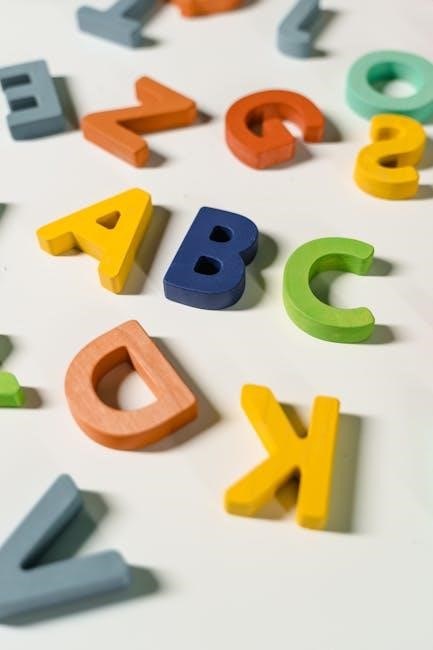
Cognitive Skills
Cognitive skills include problem-solving, memory, and understanding basic concepts like shapes, colors, and numbers. Activities like puzzles and matching games enhance these abilities, preparing children for preschool.
Basic Math Concepts and Problem-Solving
Mastering basic math concepts and problem-solving skills is crucial for preschool readiness. Children should recognize numbers up to 10, identify shapes and colors, and demonstrate an understanding of sequencing; Simple addition and subtraction, using objects for hands-on learning, can introduce foundational math concepts. Problem-solving abilities, such as sorting objects by size or color, enhance critical thinking. Encouraging children to count during daily activities and engage in puzzles fosters these skills. These competencies prepare children for structured learning environments and build a strong academic foundation.
Memory and Attention Span Development
Developing memory and attention span is essential for preschool readiness. Children should demonstrate the ability to follow simple directions, remember routines, and engage in tasks for short periods. Activities like puzzles, matching games, and storytelling can enhance memory. Attention span can be improved through focused play and structured activities. A child’s ability to recall shapes, colors, and numbers indicates strong memory skills. These developmental milestones help children succeed in learning environments and build foundational skills for academic success. Encouraging interactive games and consistent routines at home can further support these abilities, ensuring a smooth transition into preschool.
Physical Development
Physical development in preschoolers involves refining fine motor skills, like using utensils or drawing, and gross motor skills, such as running or balancing, through play and practice.
Fine Motor Skills and Hand-Eye Coordination
Fine motor skills involve precise movements, like using scissors or holding pencils, while hand-eye coordination requires tracking objects and guiding movements. These abilities are crucial for tasks such as drawing, dressing, and using utensils. Preschoolers often develop these skills through activities like puzzles, playdough, and stacking blocks. Parents can support this development by providing opportunities for practice, such as tracing shapes or coloring within lines. These skills lay the foundation for academic readiness, including writing and engaging in hands-on learning. Ensuring a child can perform these tasks independently is a key indicator of preschool readiness. Regular practice and playful exercises can help enhance these abilities effectively.
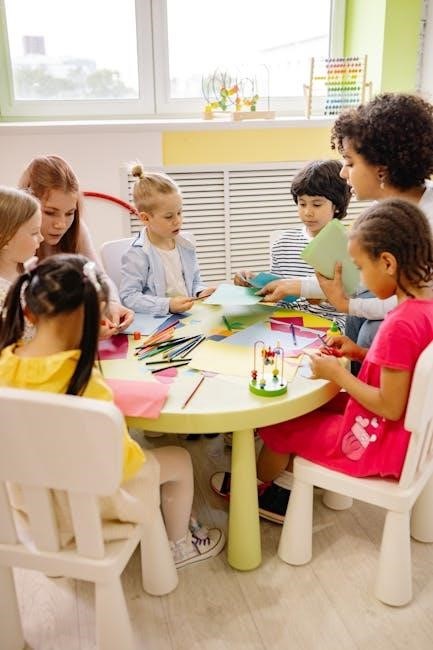
Gross Motor Skills and Movement
Gross motor skills involve the coordination of large muscle groups, enabling activities like running, jumping, climbing, and balancing. These abilities are essential for physical development and overall readiness for preschool. Children should demonstrate control over their bodies, such as kicking a ball, hopping on one foot, and moving with purpose. Improving these skills helps with coordination, balance, and confidence. Preschool programs often incorporate structured activities, like dance sessions or obstacle courses, to enhance these abilities. Parents can support development by encouraging outdoor play, sports, and active games. Mastery of gross motor skills is a key indicator of preschool readiness, as it promotes independence and participation in physical activities alongside peers. Regular practice and engaging in dynamic play can significantly strengthen these skills in young children.
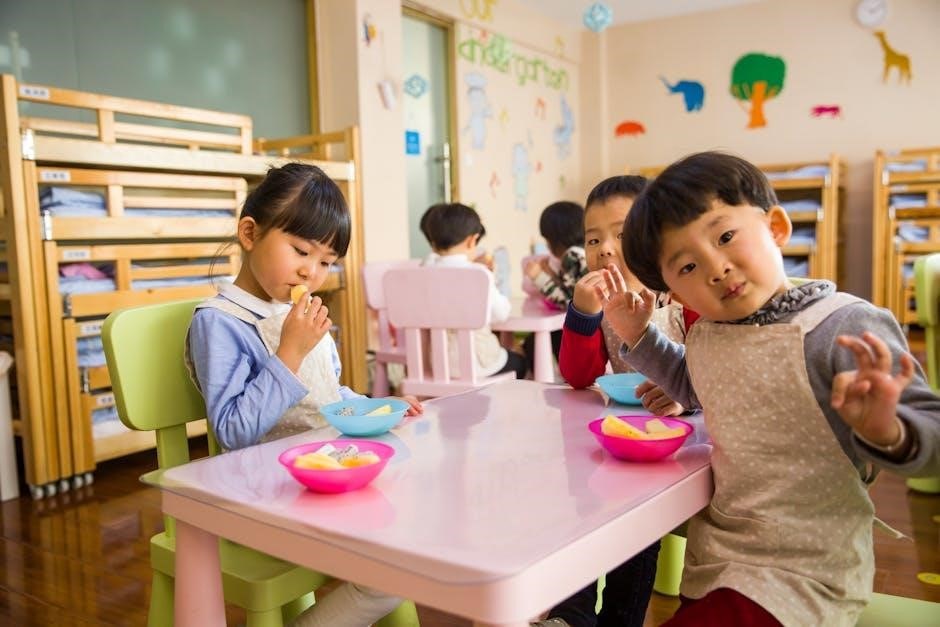
Communication Skills
Effective communication skills are vital for preschool readiness, enabling children to express thoughts, listen actively, and engage socially. Strong verbal and listening abilities foster confidence and learning.
Verbal Expression and Language Development
Verbal expression and language development are crucial for preschool readiness. Children should demonstrate the ability to articulate thoughts clearly, use complete sentences, and identify basic shapes and colors. They should also engage in simple conversations, listen to stories, and retell them in their own words. Understanding and following directions are key indicators of language development. Parents can support this by reading daily, encouraging dialogue, and providing opportunities for social interaction. A preschool readiness checklist often includes milestones like naming body parts, describing pictures, and using descriptive language. These skills lay the foundation for future academic success and effective communication.
Listening Comprehension and Following Directions
Listening comprehension and following directions are essential skills for preschool readiness. Children should demonstrate the ability to understand and respond to simple verbal instructions, such as picking up toys or completing a task. They should also show an understanding of stories read aloud and answer basic questions about the content. Listening skills are further assessed by the child’s ability to follow multi-step directions and engage in conversations. Parents can foster this development by reading books together, singing songs with actions, and encouraging active listening during daily routines. A preschool readiness checklist often includes milestones like identifying objects when named and completing simple tasks independently. These skills are foundational for classroom participation and learning.
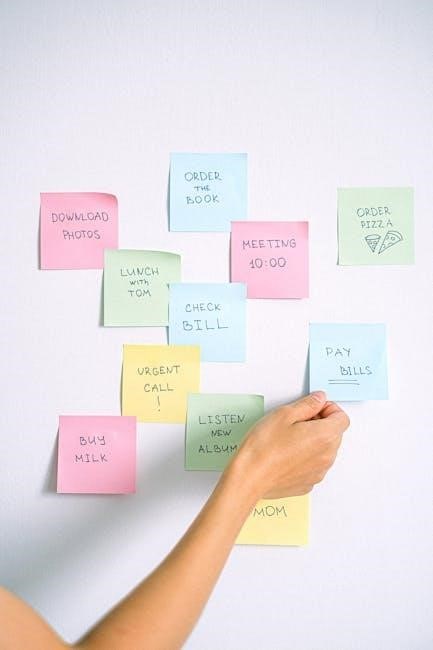
Additional Tips for Parents
Encourage daily reading, engage in meaningful conversations, and provide opportunities for social interaction. Foster independence by allowing children to complete simple tasks on their own.
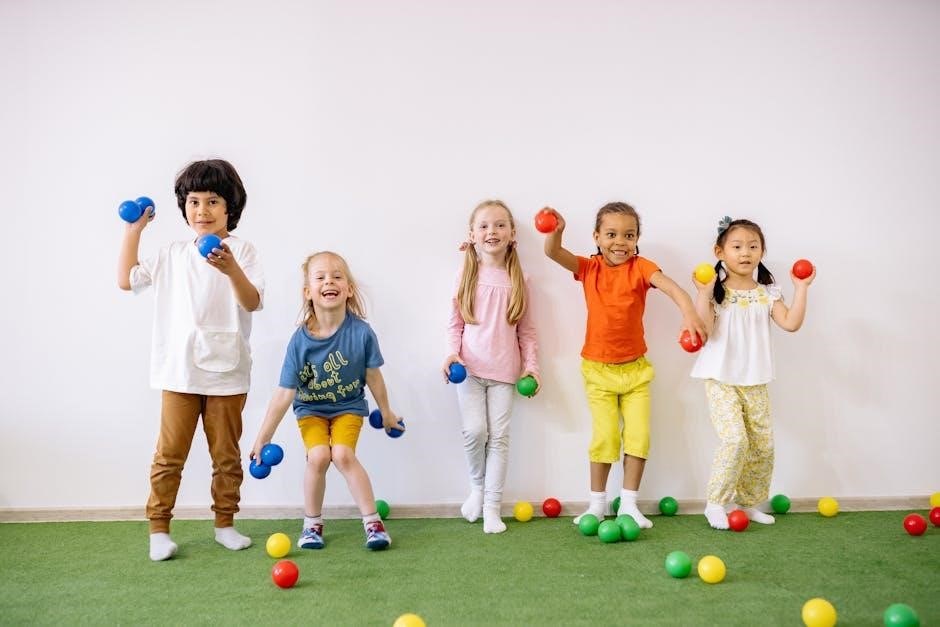
Home Activities to Promote Readiness
Engage your child in daily reading to enhance language skills and imagination. Encourage singing nursery rhymes to improve memory and rhythm. Provide puzzles and building blocks to develop fine motor skills and problem-solving abilities. Role-playing with dolls or action figures fosters social-emotional growth and creativity. Introduce sorting games using shapes and colors to build cognitive skills. Involve your child in simple household tasks, like setting the table, to teach responsibility. Create art projects to express creativity and refine fine motor control. Practice counting and basic math concepts through everyday activities, like baking. Encourage physical play to improve coordination and gross motor skills. These activities create a strong foundation for preschool success and lifelong learning.
Choosing the Right Preschool Program
When selecting a preschool program, consider factors like the learning environment, curriculum, and teacher qualifications. Look for a program that aligns with your child’s needs and your family’s values. Ensure the preschool offers a nurturing and safe space with experienced staff. Check the student-to-teacher ratio to guarantee personalized attention. Review the curriculum to see if it balances play-based learning with early academic skills. Visit the preschool to observe classroom dynamics and ask about communication policies. Inquire about extracurricular activities and how they support overall development. Read reviews and ask for referrals from other parents. A well-suited preschool program lays a strong foundation for your child’s educational journey and fosters a love for learning.
A preschool readiness checklist is a valuable resource for families preparing their children for early education. By focusing on social-emotional, cognitive, physical, and communication skills, it ensures a smooth transition to preschool. Parents can use this tool to identify areas for growth and engage in activities that promote readiness. Choosing the right preschool program further enhances this process, offering a nurturing environment tailored to a child’s needs. Ultimately, a well-prepared child enters preschool with confidence, curiosity, and a strong foundation for future success. This checklist serves as a guide, helping parents and educators collaborate to foster holistic development and lifelong learning.
